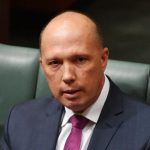Government Promises Not to Abuse its New Powers

Federal Attorney-General Christian Porter is adamant that neither the current nor any future government would ever use the proposed expanded Defence Act powers to call on the defence force for domestic purposes.
The Defence Amendment (Call out of the Australian Defence Force) Bill 2018 was introduced into Federal Parliament in late-June, with the stated objective of pre-authorising the Australian Defence Force (ADF) to respond to terrorist incidents.
However, the proposed law patently enables state and territory police to request ADF support for any widespread or coordinated violent incident, including riots that have nothing to do with terrorism, raising concerns the powers could be used to quash protests.
Justification for the powers
As is usually the case, the government says it must expand its powers to protect against the threat of terrorism.
“The terror threat we face today is greater and more complex than that we faced when these laws were introduced almost 20 years ago,” Mr Porter warned.
He confirmed at the same time that the powers to call-in the ADF, “Are available to states and territories to assist with other major incidents, such as geographically dispersed or otherwise widespread, coordinated acts of violence or other domestic incidents that threaten the security and lives of Australians.”
Mr Porter went on to claim it is “almost inconceivable” and “pretty fanciful” that the ADF would be called to deal with any riot.
But many question why, if that were the case, the limitation is not reflected in the wording of the legislation.
Vague, subjective concepts
The bill outlines that the AG can authorise two distinct types of call-out orders: Commonwealth interests orders and State protection orders.
Under the former, the ADF can be called out to protect “Commonwealth interests” in Australia or the Australian offshore area.
Under the latter, states and territories can apply for protection against “domestic violence”.
Neither term is defined or qualified, leading commentators to suggest that almost any act of public dissent or disorder can justify a call-out.
For example, a “Commonwealth interest” might be to prevent the breach of industrial laws, or even simply to maintain law and order.
Many see the use of extremely broad terms as intentional and problematic, opening the floodgates for the ADF to be used against citizens it is supposed to protect against external threats.
Commenting on similar regulations in Great Britain, former Commissioner of the Metropolitan Police Sir Robert Mark, made clear that military personnel should only be used in extremely limited emergency situations or disasters, such as floods or the protection of essential services.
“The over-riding principle governing all such activity, however, is that the troops should never, in any circumstances, be used to confront political demonstrators or participants in industrial disputes. Whatever logistical support they render, they must be protected by police who alone must deal with any violence arising from objection to their support”, he stated.
No similar statements have been made in Australia.
Lowering the threshold, and throwing legal safeguards out the window
The proposed laws will reduce the test for calling-in the ADF from ‘only when the state or territory cannot do the job’ to when the presence of the army is likely to ‘enhance’ the police response.
It is a significant lowering of the threshold – indeed, it could be argued that military presence may enhance the ability to deal with any public disorder.
The Federal Government is also giving itself the power to make “contingent” call-out orders, which represent ‘catch-all’ provisions for hypothetical future scenarios. Contingent call-outs are currently limited to aviation threats.
And significantly, the laws give ADF personnel virtually unfettered power to require individuals to answer questions, to search individuals and their property, and to detain them without a reasonable suspicion of wrongdoing.
Legislative process
The deadline for submissions regarding the bill was 31 July 2018.
The Australian Lawyers for Human Rights group submitted that the legislation is inconsistent with Australia’s obligations under the International Covenant on Civil and Political Rights (ICCPR).
They also raised concerns about the blurring of lines between the police and military, two groups with vastly different purposes.
And Civil Liberties Australia submitted that, “the bill over-reaches its claimed aims considerably. It is a sledge-hammer to crack a nut.” The group expressed concerns regarding the lack of accountability mechanisms, saying the proposal allows for the ADF to be called out for virtually any reason.
They expressed the view that Mr Porter is not in a position to comment on whether present or future governments might ‘misuse’ the powers, pointing out that similar laws in other countries “… have led to suppression of virtually all dissent and violent confrontation in the streets.”







